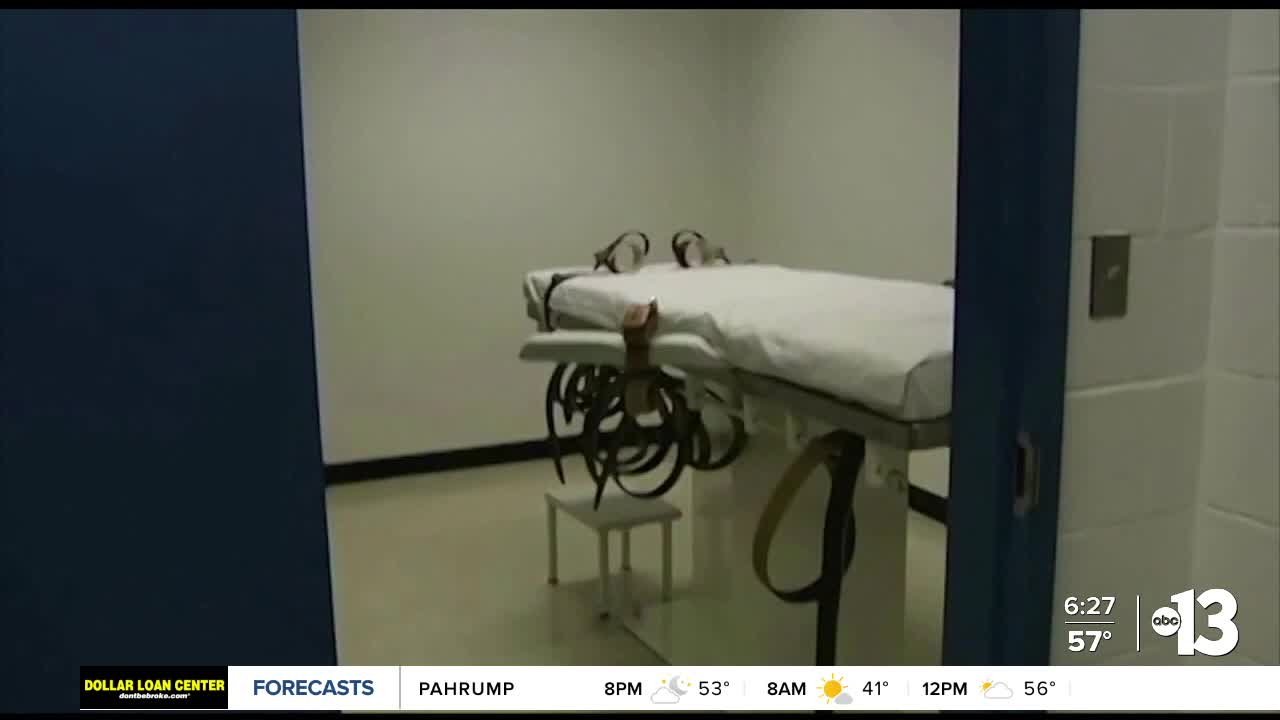LAS VEGAS (KTNV) — A new book is looking at the death penalty in America through the eyes of a Nevada inmate.
The Volunteer, which is on sale now, focuses on the story of Scott Dozier.
In 2002, Dozier murdered two drug associates, who were later identified as Jeremiah Miller and Jasen Greene. Miller was killed at the La Concha motel in Las Vegas while Greene's decomposing remains were found in the desert north of Phoenix.
Dozier was convicted for both of those murders and given the death penalty in 2007.

Dozier wrote letters to Clark County District Court Judge Jennifer Togliatti stating that he would volunteer to be executed. Only about 10% of all inmates on death row in the United States volunteer to die.
"It is my understanding that to facilitate this, I must discontinue current legal proceedings and waive all future appeals, please consider this a formal request do so," he writes in one letter. "Additionally, I would ask that no motions, complaints or otherwise, countermanding or contrary to the above, by anyone other than myself, be heard or otherwise entertained by the court."
However, his execution was delayed twice.
CHANNEL 13 ARCHIVES: Nevada's first execution in many years halted
"Just get it done, just do it effectively and stop fighting about it," Dozier told The Associated Press during a phone interview in August 2018.
Gianna Toboni, who wrote The Volunteer, spent a lot of speaking and visiting with Dozier and his family while researching her book. She says Dozier was prepared to die and the delays frustrated him.
"Typically, when you hear about organizations like the ACLU and Reprieve, they're usually helping inmates. They're trying to prevent the executions. But when you have an unusual case like Scott Dozier, where he prefers execution to a life in prison, he really felt like these advocacy groups were working against him," Toboni explained. "He felt like these are the groups that are supposed to have my back and they don't have my back. He used clear language and lots of profanities when talking about how he felt about these organizations working against his pursuit of execution."
As his execution date got further and further away, Dozier's mental health deteriorated and he ultimately died by suicide in 2019.
"Scott Dozier taught me that sometimes not getting executed is actually worse than the execution itself," Toboni said. "What does that say about our prison system and specifically, the prison system in Nevada?"
Toboni used Dozier's case as a window into the death penalty system in the United States.
Here in Nevada, between 1977 and 2017, 186 Nevadans were given the death penalty. Of that number, only 12 people have been executed and the last state execution was in 2006.
I asked Toboni what makes Nevada different, in terms of legislation or how the death penalty is carried out.
"In Nevada, I thought it was interesting that there continues to be this pursuit of death sentences by prosecutors, by district attorneys, and yet, there doesn't seem to be the political will to actually carry out the executions," Toboni said. "There's a little bit of hypocrisy in the Nevada political system in that legislators aren't willing to outlaw the death penalty but they're also unwilling to legalize another method of execution to make it possible for them to carry out executions. If they really wanted the death penalty, they could legalize a firing squad as other states have done. I think this is sort of a political charade in Nevada. I think there is political benefit to pursuing death sentences but there is a lot of risk that comes with actually carrying out executions."
When looking at past legislative sessions, in 2021, Nevada lawmakers introduced a bill to repeal the death penalty.
While the bill passed the state assembly, it didn't make it through the state senate.

How will different execution methods change future policy?
Over the last year, inmates have elected to be executed in ways other than lethal injection. For example, in South Carolina, a man chose to die by firing squad and in Louisiana, a man chose to die by nitrogen gas.
Toboni says it's because lethal injection isn't the most effective way to carry out the death penalty.
"I think a lot of people in the public think these guys are peacefully going to sleep in the death chamber (when they have a lethal injection). We know from expert witnesses and anesthesiologists, who have reviewed hundreds of autopsies, who have witnessed these executions, who know these drugs better than anybody in the world, what they say is to a medical certainty, these people are suffering," Toboni explained. "When we talk about firing squads and nitrogen gas, a lot of people are stunned like oh my God, we're going back to these gruesome methods. Well, guess what? Lethal injection is pretty brutal too. It may not appear that way but it is. It has the highest rate of botched executions at 7%. When you look at something like a firing squad, the botched rate is effectively zero."
There are also issues when it comes to obtaining drugs. Lethal injections are usually a combination of three different drugs, which are not FDA approved. Many pharmacy companies have also banned states from buying certain medications if they know the drugs will be used for lethal injections.
So where are states getting the drugs?
"At this point, a lot of states are going to what are called compounding pharmacies. Typically, these pharmacies are used for people who have allergies but need a specific medication so combining different ingredients in order to make a custom drug for somebody," Toboni told me. "They're not in any way regulated by the federal government, which in some ways works for these states and prison systems because they can kind of quietly got to the compounding pharmacy and say we need these drugs and maybe not really give a reason for what they're going to use the drugs for."
Will the system ever be fixed?
With so many factors contributing to a flawed system, I asked Toboni if she thinks the American death penalty system will ever be fixed.
"There is incredible racial bias, which a lot of people think has gotten better over the years. In fact, there are researchers as recent as 2020 that found our biases have gotten worse. That is so shameful. We're not even moving in the right direction," Toboni said. "There continue to be people who are wrongfully convicted who land on death row. Who knows how many wrongfully convicted or innocent people have been executed in our country? The fact we continue to do this suggests to me that this is a fundamentally broken system that will never be fixed in our country."





